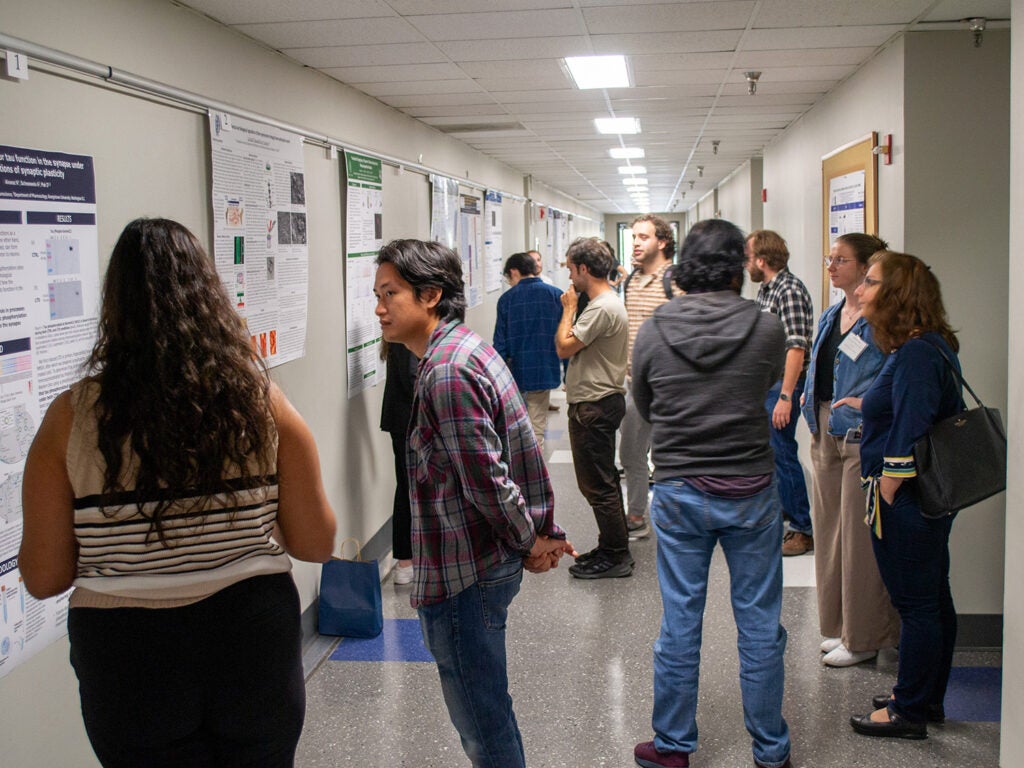Wednesday, October 16

Since 1985, Student Research Day has provided an on-campus forum for students to showcase their research pursuits. For students in the Ph.D. programs at the Georgetown University Medical Center or Graduate School of Arts & Sciences, the day offers the opportunity to share their dissertation research with their colleagues from other disciplines while engaging in discussion and soliciting feedback.
Student Research Day is open to all current graduate students in these Ph.D. programs: Biochemistry and Molecular & Cellular Biology; Biology; Cell Biology; Chemistry; Global Infectious Disease; Microbiology & Immunology; Neuroscience; Pharmacology; Physics; Psychology; Physiology & Biophysics; Tumor Biology.
Quick Links
- Zoom link for remote attendees
- Medical Center Graduate Student Organization
- Contact MCGSO
- Sign up to be a judge
Schedule
| October 16 | Event |
|---|---|
| 12:00‑12:30 p.m. | Welcome Reception Medical and Dental Building – Harvey Amphitheater North |
| 12:30‑1:30 p.m. | Keynote Speaker: Dr. Ukpong Eyo Medical and Dental Building – Harvey Amphitheater North |
| 1:30‑2:00 p.m. | Informal Chat with Dr. Eyo Medical and Dental Building – Harvey Amphitheater North |
| 2:00‑4:00 p.m. | Oral Presentations Medical and Dental Building – Harvey Amphitheater North |
| 4:15‑6:00 p.m. | Poster Presentations Preclinical Science Building – Hallway C |
| 5:00‑7:00 p.m. | Reception Preclinical Science Building – next to P.O.D. Market |
| Around 6:30 p.m. | Announcement of Presentation Winners Preclinical Science Building – next to P.O.D. Market |
Keynote Speaker

Dr. Ukpong Eyo
Ukpong Eyo is an associate professor and principal investigator of the MicroglEyo Lab at the University of Virginia. His research focuses on the role of microglia, the brain’s resident immune cells, during development, maturity and disease. Dr. Eyo investigates how microglia interact with neurons, glia, and the vasculature during normal brain development and in response to pathologies like seizures, ischemia, and neurodegeneration. His lab uses cutting-edge imaging techniques, genetic models, and molecular approaches to explore the dynamic roles of microglia from early brain development to maturity. With a passion for mentoring, Dr. Eyo emphasizes the importance of diverse perspectives, inclusion of diverse individuals in, and collaborations in science. His work aims to uncover therapeutic targets for treating brain injuries and developmental disorders, contributing to the understanding of how microglia shape both healthy and diseased brains.
Presentations
The deadline for abstract submissions has passed.
Posters
Once you have received an email from MCGSO confirming the acceptance of your abstract for a poster presentation, you will need to ensure that your poster is prepared. Keep in mind that like your abstract, your poster and poster presentation should be geared toward a general science audience.
If you have a poster already printed from a recent meeting, you are welcome to use it. Please send us the dimensions of your poster so we can reserve adequate space for you. If you are creating a new poster, we may* be able to assist in the cost of poster printing (*to be determined). You will receive details about poster specifications and deadlines in your confirmation email.
As we draw closer to Student Research Day, you will receive further instructions regarding poster placement, evaluations, and schedules for attending your poster.
Oral Presentations
The oral presentation sessions will consist of a series of 10-minute talks with PowerPoints, followed by 5 minutes for questions and transition. If you are interested in presenting your research in an oral format, be sure to indicate this during abstract submission. Only a select number of abstracts will be chosen for oral presentations.
Oral presentations should be geared to a general science audience.
Presentation Evaluation
Poster and oral presentations will be evaluated for the following categories: background/introduction, hypothesis or objective, methods, results, conclusion or discussion, future work, overall presentation and handling of questions, and quality of the poster or PowerPoint presentation.
Call for Judges
We are seeking faculty, staff and postdocs to give feedback and scores for students’ oral and poster presentations.
